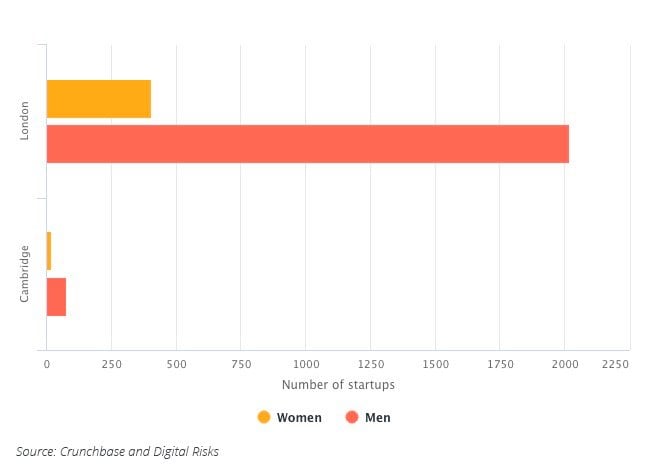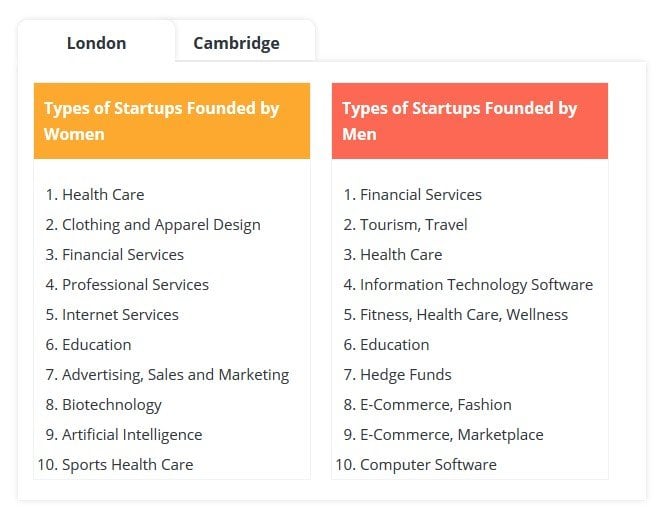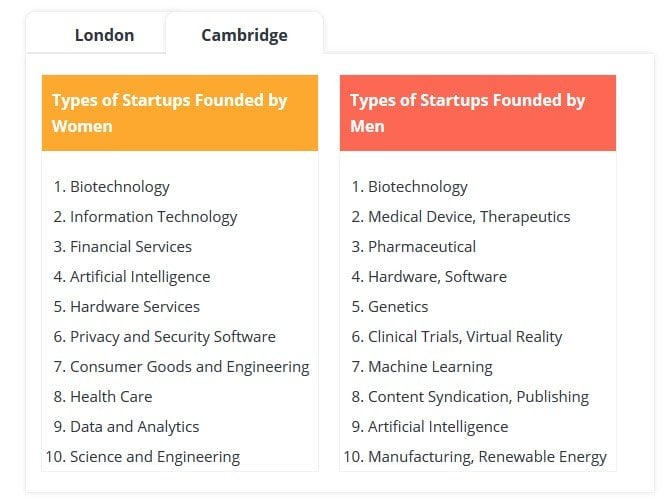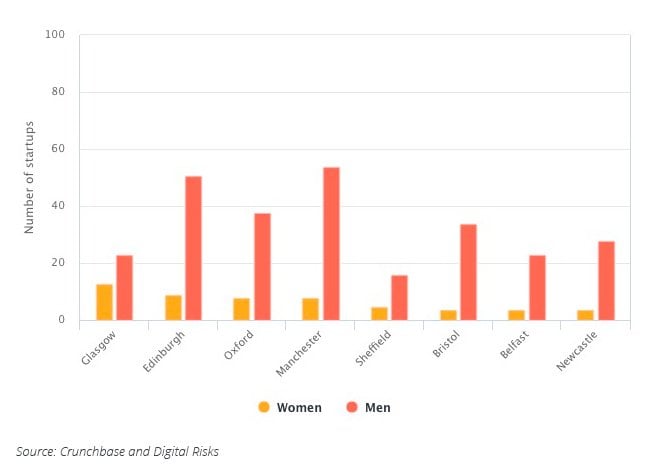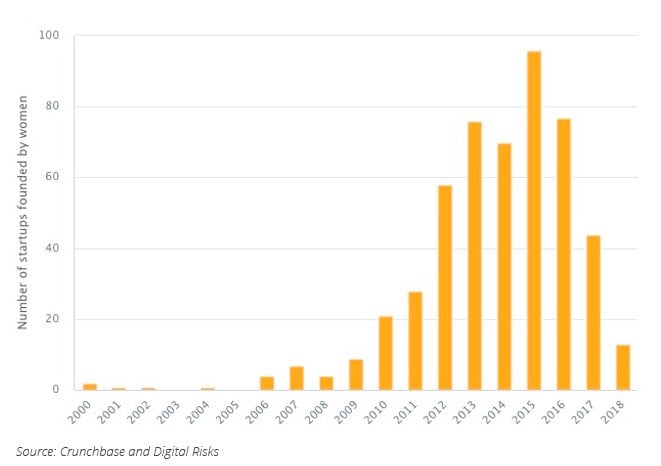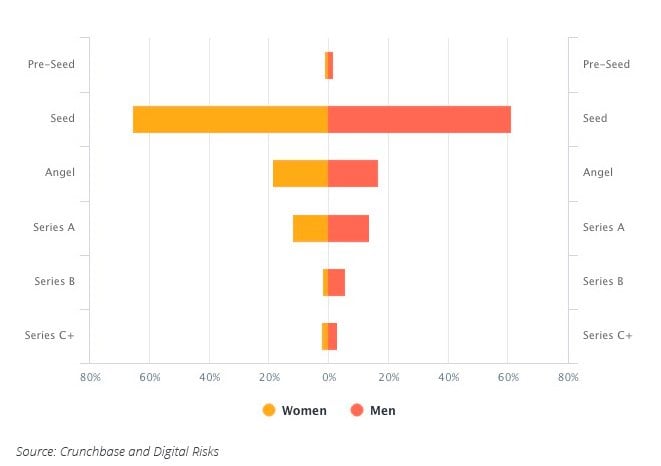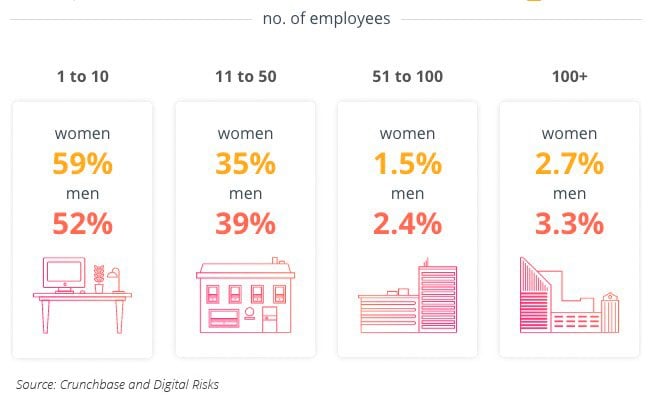Men still dominate the UK startup landscape, with 80.6% of companies launched between 2000-2018 being founded by men
It’s safe to say that the UK’s startup scene has always been largely a Y-chromosome dominated space. Over the past few years, the UK government and independent bodies have increasingly made efforts to level the playing fields between male and female entrepreneurs.
[REITs]Q4 hedge fund letters, conference, scoops etc
However, a recent analysis of Crunchbase data by Digital Risks, a London-based Insurtech company, shows that there is still a large disparity in the funding received by male and female entrepreneurs. With research suggesting that funding may be the biggest barrier to increasing female participation in entrepreneurial activity, it’s no surprise that the analysis shows that, between 2000-2018, women entrepreneurs have founded over 500 still-active startups in the UK, while in comparison men have founded five times this number.
In addition to the analysis, Digital Risks ran a series of interviews with successful women entrepreneurs to reveals some of the reasons why this might be the case. Sam White, CEO of Pukka Insure, explained “I think there are genuine biases against women, particularly around getting funding, – I know this from personal experience. That said, being aware of that and challenging yourself to overcome those barriers is a great place to start. And let’s not forget that generally speaking, women are more collaborative and community-minded than men, these attributes definitely help when setting up by yourself.”
Romi Savova, Founder and CEO, Pension Bee highlights the difficulties women entrepreneurs can face when starting a family while running a successful startup, adding “Bearing children is not optional for women and businesses need to have the right policies in place to encourage and support women to return to the workplace in their full capacity. I think integrating home life and work life, enabling mothers to fulfil their career ambitions, is the direction we need to take as a society.”
When analysing differences between the types of startups founded by men and women, despite there being a large disparity between funding and the number of startups founded by men and women, there are many similarities in the top 10 types of startups founded. The top three types of startups are the same for both men and women, these being health care, e-commerce and artificial intelligence. The only differences are BioTechnology, online marketplace and fashion in the women’s top ten, while advertising, financial services and machine learning feature for men.
Charlotte Guzzo, Co-founder & COO, Heterogeneous, a patient-centric research platform based in Cambridge, explains “We wanted to build a platform that would allow individuals to truly be a part of the research process and to contribute to scientific progress. We thought that if people knew the difference, they could make with their data, they would likely want to participate and benefit from cutting-edge insights about their own health in the process. Unlike many direct-to-consumer sequencing companies, however, we also felt that it was fundamental for individuals to fully control their data and decide who can access it and for what purpose.”
It’s no surprise that London and Cambridge lead the way with the greatest number of startups being founded by women, followed by Glasgow, Edinburgh and Oxford, Manchester, Sheffield, Bristol, Belfast and Newcastle. This could be due to the availability of support and resources for women entrepreneurs in these cities. Cllr Kate Campbell, Housing and Economy Convener, Edinburgh Council said: “I’m pleased to see that Edinburgh is getting the recognition it deserves for work being done in this area. Our dedicated start-up workshops for women run through the Business Gateway service are proving to be very successful. Just over half of our start-ups in the city are run by women and half of those attending the Gateway to Investment programme were women as well. We held a popular leadership programme for women in business event last year. And to mark International Women’s day in 2019 we are celebrating with a Women in Business event on 8th March.”
Since 2008, the number of tech startups founded by women has been increasing rapidly. Only nine successful startups were founded by women in 2009, while in 2015 there were 96 founded, an increase of 967%. This increase reaches a peak in 2015 and has been on a steady decline since, this is also the case for men-led startups. This could be due in part to the UK’s decision to leave the European Union and a lack of clarity amongst the investment community over what effect this will have on businesses in general and early-stage ventures in particular. Additionally, recently the industry has seen investor appetite moving away from Angel and Seed investment towards funding more mature businesses at later stage investments in areas like finance.
Digital Risks’ analysis reveals that women founded tech startups in the UK receive just 12.8% of total funding. While on average per round of funding, men receive 45% more (£2,603,140) than women (£1,796,296). Orla Shields, CEO and Co-Founder, GetRentr, added “…if you look at the statistics, far fewer female entrepreneurs get VC and angel investment for their businesses and I do think this is an issue. There are fewer female entrepreneurs, of course, but I think when you allow for that, there are still far too few female entrepreneurs getting funded. It’s hard to say what the reason is, though my hunch is that there are also far fewer female investors. The fact that we as female entrepreneurs are pitching to men 99% of the time may mean that there is sometimes an unconscious bias.”
While there have been improvements and more focus on supporting women entrepreneurs, as this data suggests, there is still a long way to close the gap between men and women in the UK’s startup landscape. Initiatives such as the STEMettes, a social enterprise to support young women into science, technology engineering and maths careers and the introduction of the Shared Parental Leave Law are just an example of some of the necessary steps being taken towards this goal.
Annabel Mekelenkamp, Director, Digital Risks commented “Tech startups continue to reflect the challenges women face in the broader STEM-based (Science, Technology, Engineering, Mathematics) professions. Despite an increasing number of successful, high-profile female role models providing inspiration for the next cohort of female entrepreneurs, there’s still a gulf in the volume of startup tech businesses, deals, and levels of funding versus male peers. Technology advancements continually trumpet the breaking down of barriers within markets but we’re still, it seems, a long way from a level playing field when it comes to gender in the startup world.”



